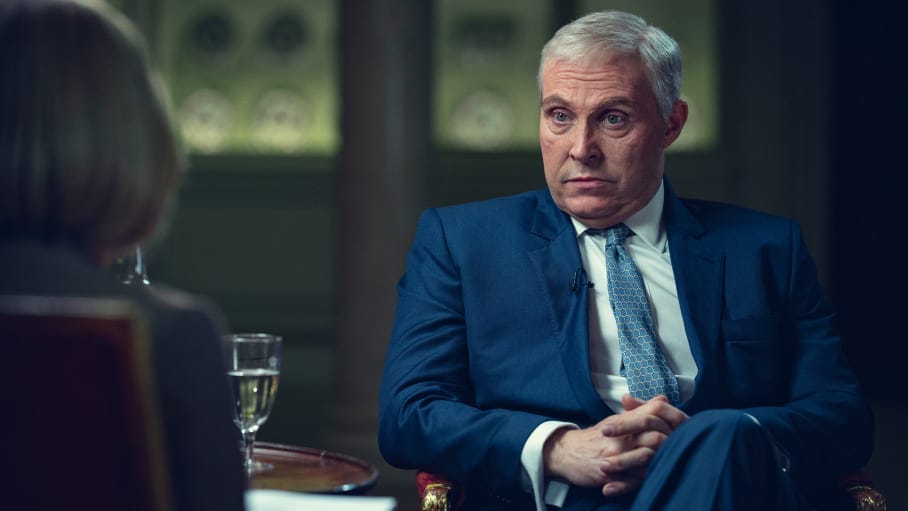The Problem With Netflix's Scoop?
It Subtly Knocks Prince Andrew's Interviewer, Emily Maitlis
Over the weekend, I watched Scoop, Netflix’s take on the car-crash of a TV interview given by Prince Andrew about the allegations concerning himself, Jeffrey Epstein and Virginia Giuffre.
The movie was entertaining enough, but, for my money, it misfired on two subjects.
First, Prince Andrew himself. As played excellently by Rufus Sewell, the movie aptly captures the Prince’s vanity, frustrations and the bubble-wrap of privilege around him, giving rise to that disastrous interview. After which he announced he’d step back from his royal duties.
But let’s not forget that he wasn’t actually stripped of his royal titles and essentially exiled until years later, in 2022, and for something far more serious than pomposity. That’s something that does not get mentioned in Scoop. Namely that Ms. Giuffre sued him for sexual abuse when she was a minor and he settled with her for an undisclosed sum and it was THAT embarrassment, ahead of the Queen’s Golden Jubilee celebrations, that caused his death-knell.
For whatever reason Scoop doesn’t want to go there, a far darker place than the frills and furbelows of Buckingham Palace.
But the second thing I found deeply disconcerting - worse actually - were the not-so veiled digs at Emily Maitlis, the dogged News Night anchor whose persistence and penetrating, unflinching gaze were really what undid the Prince during that interview.
I’m not surprised that she is producing her own Amazon TV series based on her story, including her recollections of that interview. Which may be different from those in Scoop, which was based on a book by Maitlis’s former booker, Sam McAlister, played by Billie Piper. (Maitlis has said she did not get involved with the Netflix production. Maitlis has also been warm publicly about McAlister and vice versa. Although, in predictable British tabloid fashion, the Daily Mail suggests there is now a tabloid-style feud between the two women.)
Back to Scoop: although the movie’s script – and the actor Gillian Anderson - highlights Maitlis’s tough interviewing style, flawless memory and work ethic, Maitlis is simultaneously portrayed as someone whose social status is above that of most of her newsroom, which, it’s insinuated, is an impediment to morale. Hence there is a disdain with which her team discuss the “North London dinner party” class circuit Maitlis’s interviews appeal to. (As if they’d prefer a different audience…we don’t learn who, exactly.) And the endless shots of Maitlis’s whippet, Moody, who, in the movie, seldom leaves her side in the newsroom (something that did not happen often in reality, reportedly), are blatantly loaded with classist snark. (Who is the other famous English woman who brought her dogs everywhere?)
The movie is based on McAlister’s book, Scoops, about the ongoing battles behind the scenes at the BBC, which she subsequently left, so I understand why her challenges as a working single mother, and her perceptions of institutional elitism inside the organization are a focus.
But I don’t see why one woman’s story should be elevated at the expense of the other’s. In Scoop, in contrast to McAlister being run ragged, Maitlis is portrayed as someone whose only personal obstacle is momentarily losing her whippet in the park.
I don’t know Emily Maitlis or Sam McAlister.
I’m sure McAlister was underpaid and under-recognised at the BBC. TV bookers often are. Good for her for wrangling the interview, writing the book and getting out.
But, I rather doubt that Emily Maitlis got to be a public face of the BBC for years and years and years, without facing considerably tougher obstacles than misplacing a pet.
Does this sly condescension to her really add anything to a narrative that fundamentally pertains to be about the nexus of rich and powerful men, like Prince Andrew, who propped up Epstein by affording him either legitimacy, status or money?
I’d argue no, it certainly does not.
Women don’t need any further degradation around the subject of Jeffrey Epstein.







Kudos, Ms. Ward. This is journalism.
🤷Haven't watched by I trust your reaction... Unfortunately it seems "normal" these days that for one person to be seen as good/competent or worthy, another has to be less so. In real life, two things can be equal but different, but that doesn't translate well to drama (except for All the President's Men authors - Bernstein & Woodward perhaps?)